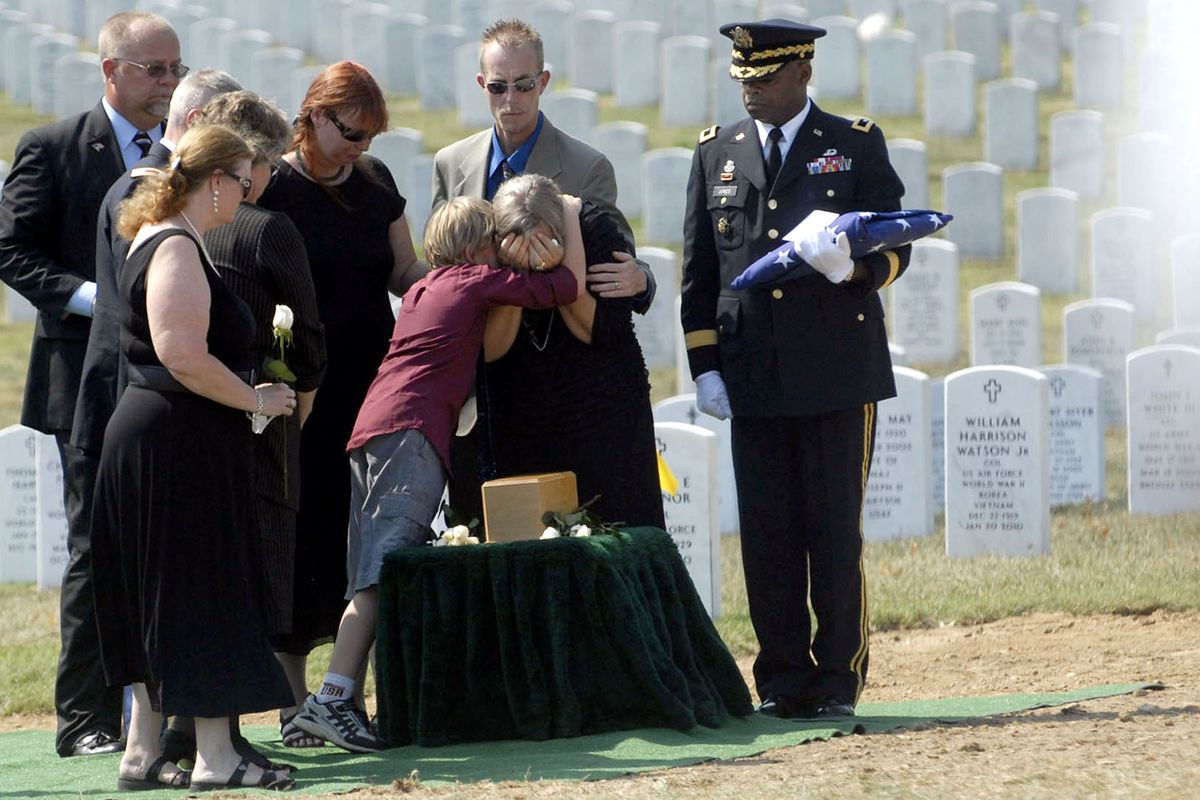Medal of Honor recipient Baker buried at Arlington

ARLINGTON, Va. – A caisson drawn by seven white horses carried Vernon J. Baker to his final resting place in Arlington National Cemetery today under the solemn watch of the 3rd Infantry Regiment Honor Guard – starched and sharp in full dress blues despite the stifling September sun.
Four soldiers from the nation’s oldest infantry regiment led the procession along Arlington’s narrow asphalt lanes, followed by the U.S. Army Band, 18-white gloved riflemen, the color guard and the flag-draped caisson. An eight-man casket team, a lone Medal of Honor flag bearer and three Vietnam Medal of Honor recipients came next. Widow Heidy Baker, escorted by Medal of Honor recipient Tom Norris and Maj. Gen. Reuben Jones, brought up the rear with a long line of mourners that included Paul Dickerson, who served with Baker in northern Italy in World War II.
They filed to Baker’s gravesite, located at the edge of a sea of white markers that stretched into trees already taking on autumn colors. A chaplain’s words spilled onto a breeze that brought minimal relief from the record-breaking 98-degree heat. A seven-man firing party snapped off three sharp rounds. Taps cried goodbye. Handkerchiefs wiped away tears and wiped brows.
Norris, retired Gen. Robert Foley, Brian Thacker, Joe Marm and Barney Barnum – all who earned the Medal of Honor in Vietnam – came forward one-by-one at the end of the ceremony to lay a yellow, long-stemmed rose beside Baker’s urn, then stepped back and saluted a hero’s farewell.
Baker, who lived near St. Maries, Idaho, was the only living black World War II veteran to receive the Medal of Honor, the nation’s highest commendation for battlefield valor. That recognition, delayed by the racism of the era, came 52 years after Baker led a suicidal assault that helped the Allies breach the Gothic Line and drive the German Army out of northern Italy. His white commander deserted him and his men during that April 1945 battle.
Baker’s widow cried quietly throughout the memorial, like many others gathered here, far from ready for this final moment, far from ready to say goodbye to the humble orphan from Wyoming who emerged with remarkable dignity and grace from some of the worst that 20th century America dealt to black soldiers.
The contingent at the memorial included Lt. Col. Mark Jackson, who, as a captain, escorted Baker to the White House in 1997 where he received the Medal of Honor from President Bill Clinton. Gen. Colleen McGuire, provost marshal general of the Army, U.S. Rep. Walt Minnick, D-Idaho, and other dignitaries also came to pay their respects.
Baker’s stepdaughter, Alexandra Pawlik, and step-grandson Vernon Pawlik, were on hand as was Kathleen Jackman, a neighbor of the Bakers in Idaho’s Benewah Valley; she also attended the White House ceremony 13 years ago.
Baker attended the reburial of the only other black World War II Medal of Honor recipient buried at Arlington – Sgt. Edward A. Carter – on a frigid day in January 1997, less than 24 hours after the White House ceremony. .
Baker would been uncomfortable with this attention, all the while proud of the recognition it brought to the forgotten black soldiers who fought in the last officially segregated combat units of the U.S. Army. He always took little credit for his deeds, insisting he was just a soldier trying to do his job.
“The real heroes were the 19 men I left on the hill that day,” Baker said repeatedly, referring to the men from his unit killed during that brutal but decisive battle.
That will inspire soldiers and citizens long after this day fades. “He’s an example worth following,” Norris said as today’s memorial concluded. “He was such a low-key, unassuming man with incredible insight and wisdom. I was incredibly lucky I was able to know him.”